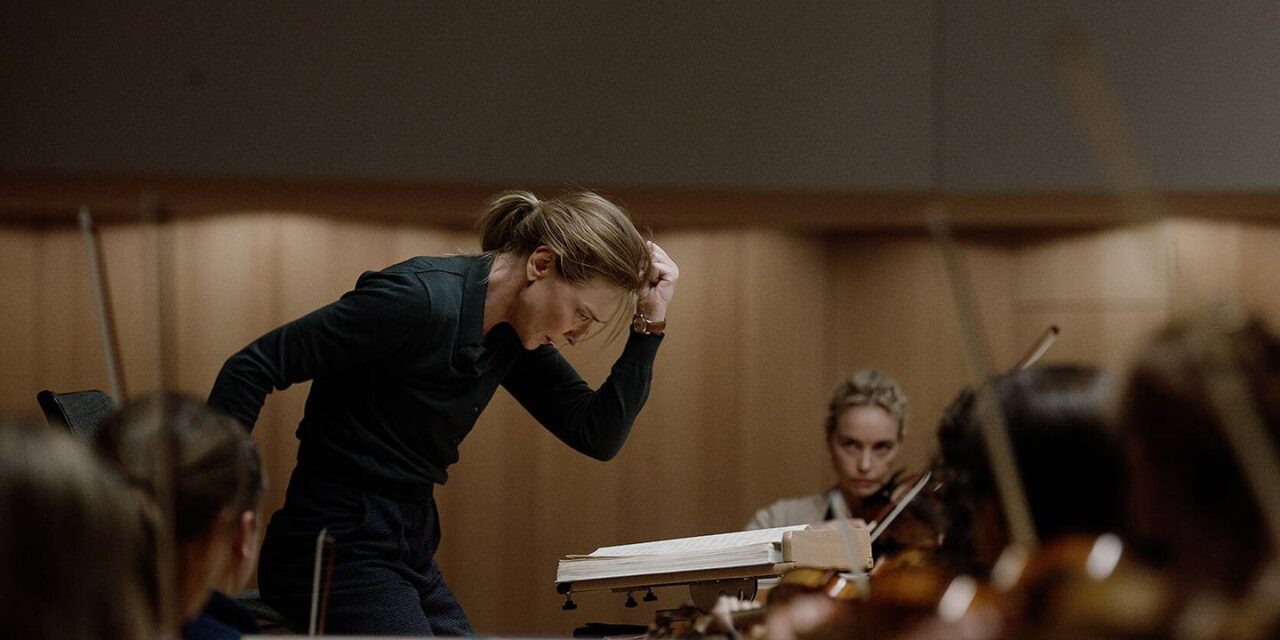This review is a part of Substream’s coverage of the 60th edition of New York Film Festival.
Who is Lydia Tár? (Cate Blanchett). Writer/director Todd Field presents her character immediately as this larger-than-life figure. The audience immediately feels that weight during the film’s opening scene. New Yorker writer Adam Gopnik interviews Tár, and at the beginning, he goes through the multitude of accomplishments Tár achieved during her time as a symphony conductor. At first, she grimaces hearing the list, but quickly settles into this grand state of assuredness when talking about being in control of an orchestra. Knowing dozens of skilled people are looking to you for direction, a certain power comes with that. However, Field’s story is about slowly losing control because leaders often lose their “god-like” aura in time. People are infallible and flawed — even if they don’t believe they can be. The “fall from grace” story has been commonplace throughout the drama genre.
However, Field combines the power of music and human vanity into an almost cautionary tale of being drunk on your greatness. In one scene, a Julliard college student informs Tár about his reservations about Bach because of his history. Tár then excoriates him in front of the entire class — going on a tangent, dissecting his inability to separate scandals from the music. It’s a question Field proposes to the audience and deconstructs with a fine-toothed comb as we learn more about Tár. Tar believes accolades should speak louder than personal conduct. It’s funny because the essence of music will often outlast the person or people who compose it. However, the concept of accountability shouldn’t be discarded.
Tár feels most at home in the flow of musical escapism because it’s not in her relationships. Her assistant, Francesca (Noémie Merlant), is quiet and ready at Tár’s beck and call and is often met with sarcasm. She might as well be a digital application. At home, Tár’s wife, Sharon (Nina Hoss), seems to be a calming influence on her boisterous life, but even she’s kept at arm’s length with a frosty hand. The only person Tár can unzip her grandiose personality with is their daughter Petra (Mila Bogojevic). During these scenes, is where Tár seems the most relatable and, dare I say…likable? However, the film quickly reminds you that this character is mainly out for themselves. This is ironic given the profession she’s in — the fact that all musicians come together to make a uniform sound. Eventually, it all has to come back to serve Tár.
Like every tragedy, there has to be an inevitable fall. Field illustrates this in two ways, discretely. Throughout Tár, Blanchett’s character is seen working on a new piece of music on the piano. But she’s constantly getting distracted by something — whether it be a doorbell or police sirens. She often can’t sleep because of the sound of a metronome or the refrigerator. Field plays these small things like a ghost story, as if the universe somehow haunts Tár’s psyche. In the background, there is a scandal brewing. A prior relationship with a former student led to her suicide, sending Tár’s world into a slow free fall. She simultaneously is the first woman conductor of a German symphony orchestra (an honor of prestige) and incessantly tries to cover up the tracks of emails and correspondence they’ve had.
Field’s story leaves us with mysteries to uncover. Blanchett’s performance is marvelous because she conveys a fiery, arrogant confidence in one minute and a contemplative sense of dread the next. While this is not a real person, Blanchett makes you believe it could be so. Perhaps Tár should have heeded the warnings of her mentor, Andris (Julian Glover), that things in society were changing. However, Tár’s poisonous belief she is above all reproach leads her gaze toward a young cellist named Olga (Sophie Kauer). Her infatuation with her is blatant — often staring at her admirably during sessions and putting her on the fast track for promotion over long-time players.
Field elects to switch this dynamic, and the predator becomes prey. It’s funny that everybody sees this coming, other than our principal character — who feels comfortable being a talented, unabashed megalomaniac. Tár presents many ideas around #MeToo, cancel culture, and if the bad things people do can overshadow the rest. It doesn’t seem like Field is choosing a particular side. Undoubtedly, Tar deserves some admonishment for playing power dynamics in the way she does. Some people will even feel satisfaction for her getting her comeuppance. Will those indiscretions cloud any further listening to her works? That’s for individuals to decide.
Photo Credit: Focus Features













